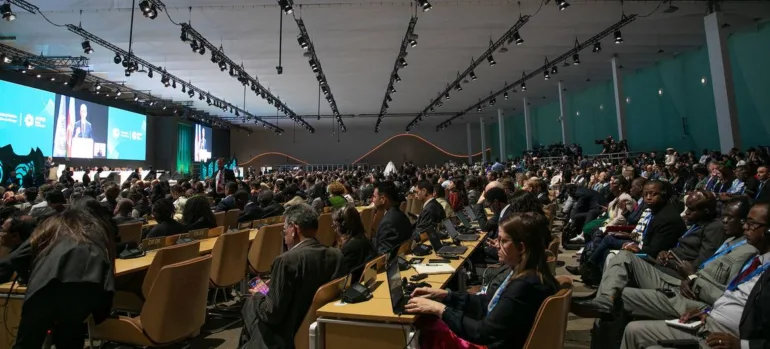After two grueling weeks of tense negotiations and sleepless nights, nearly 200 countries reached a controversial climate finance agreement at COP29 in Baku, Azerbaijan, on Sunday. The deal, which pledges $300 billion annually by 2035 from wealthy nations to help developing countries combat climate change, was hailed by some but strongly criticized by others, especially poorer nations most vulnerable to climate disasters.
The deal, finalized in a sports stadium amidst chaotic last-minute revisions, was the product of bitter bargaining. Yet, before the applause could subside, the agreement was immediately rejected by India, which described the pledged amount as “abysmally poor” and “a paltry sum.”
Chandni Raina, India’s delegate, called the deal “little more than an optical illusion” and warned that it would not address the scale of the climate crisis. “This will not meet the enormity of the challenge we face,” Raina said.
The deal highlights the longstanding divisions between developed nations—most responsible for historical greenhouse gas emissions—and developing countries, which are least responsible but suffer the most from climate impacts. For years, developing nations have called for more substantial financial commitments from wealthier countries to help them transition to greener economies and adapt to the worsening effects of climate change.
European Union climate envoy Wopke Hoekstra, however, described the agreement as “the start of a new era for climate finance,” despite its shortcomings. Diplomatic teams worked around the clock, revising the deal’s final wording, with tensions running high and several moments when talks seemed on the verge of collapse. At one point, delegations from developing nations stormed out of meetings, demanding more financial support from the wealthier countries.
In the end, the deal was passed, although many felt it fell well short of expectations. Under the new agreement, developed countries are committed to mobilizing at least $300 billion annually by 2035 to support climate adaptation and mitigation efforts in developing nations—up from the $100 billion originally pledged under the Paris Agreement. However, the amount was immediately dismissed as insufficient by developing countries, who had demanded at least $500 billion per year.
“This COP has been a disaster for the developing world,” said Mohamed Adow, director of Power Shift Africa. “It’s a betrayal of both people and planet by wealthy countries who claim to take climate change seriously.”
The call for more funds
The $300 billion pledge is seen as a step forward by some, but it is far less than the $500 billion requested by 134 developing nations to build climate resilience and reduce emissions. UN climate chief Simon Stiell acknowledged the deal’s imperfections, stating, “No country got everything they wanted, and we leave Baku with a mountain of work still to do. So this is no time for victory laps.”
The deal also encourages emerging economies like China, the world’s largest emitter, to contribute voluntarily to climate finance. However, it does not impose binding obligations on these countries, which has led to disappointment among poorer nations.
Wealthier nations, including the US and EU, had also pushed for new financial contributions from countries like China, but the deal only “encourages” voluntary contributions from these emerging economies. The final deal includes a broader target of $1.3 trillion per year for climate-related funding, though most of this is expected to come from private sources rather than government contributions.
Fossil fuel disagreements
One of the most contentious aspects of the negotiations was the attempt by Saudi Arabia to weaken commitments to phasing out fossil fuels. In the final texts of the deal, there was no explicit mention of the goal from last year’s summit in Dubai to transition away from fossil fuels. This has raised concerns, particularly among small island nations and wealthy countries, who fear that the influence of fossil-fuel-dependent nations like Saudi Arabia has watered down critical climate commitments.
Many countries, including small island nations facing existential threats from rising sea levels, expressed frustration over the lack of stronger commitments to reduce fossil fuel use. Azerbaijan, an oil and gas exporter, was also accused of lacking the political will to tackle climate change effectively.
As the world faces rising temperatures, extreme weather events, and other climate-induced disasters, the deal reached at COP29 represents a compromise—but one that leaves many developing nations dissatisfied with the pace and scale of global climate action.
AFP


